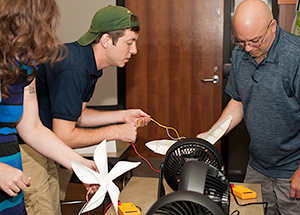Teach the Teacher: Mascaro Center Shares Green Engineering with Area Schools
A voice shouts, “.24 volts!” over the din in a Benedum Hall classroom. Twenty local schoolteachers are competing to build the most efficient wind turbine, using corks, index cards, and tape. They test their prototypes in front of a fan with a voltage meter. The announcement of .24 volts sends a murmur through the group; it’s the score to beat.

The teachers are participating in Teach the Teacher, an annual two-day workshop about integrating engineering and sustainability concepts into middle school curricula. The training is designed and hosted by Pitt’s Mascaro Center for Sustainable Innovation, which spearheads sustainability programs in the Swanson School of Engineering. The center’s mission is to spur innovations that will benefit the environment, both at Pitt and in the larger community.
Prior to the development of Teach the Teacher, the Mascaro Center sent its experts into the region’s classrooms to talk about engineering with elementary, middle, and high school students. But the center soon became inundated by requests from area schools wanting guest speakers on the subject. Mascaro Center leaders realized they could have a greater impact if they taught teachers to teach the subject themselves. Now in its third year, the Teach the Teacher program has trained 60 educators from Western Pennsylvania. (The center still sends experts out into area classrooms, too, for targeted purposes.)
“Teach the Teacher helps middle school teachers rejuvenate their curriculum,” said Gena Kovalcik, codirector of the Mascaro Center. “It helps students understand engineering in the context of their community.” She also hopes the program will encourage more students to study engineering in college.
“This generation will have to solve problems we don’t even know about yet,” said David Stehouwer, a science teacher at the Environmental Charter School at Frick Park, Regent Square, who participated in the windmill workshop. He came to the June 20–21 training to learn more about integrating engineering into his classes. “It’s part of the national education standards, but tends to be on the periphery,” he said.
Teach the Teacher helps educators strengthen their knowledge of sustainable engineering while addressing national educational standards. The two-day workshop was designed in collaboration with Pitt’s Institute for Learning and the Swanson School’s Engineering Education Research Center. Experts from those centers helped to design learning modules, based on research by Pitt professors, that are appropriate for middle school students and that address the standards. For example, in one module, students modify existing board games like Yahtzee and Apples to Apples to illustrate the concepts of green building. This is based on the work of Melissa Bilec, associate professor of engineering and deputy director of the Mascaro Center, who studies sustainable building design.
David Sanchez, Mascaro Center assistant director and an assistant professor in the Department of Civil and Environmental Engineering, runs the two-day workshop. He described it as “presenting the best of what we have in engineering and giving teachers the creative autonomy to fuse that into their classrooms.”
Julie Yacoviello, a special-education teacher at Shaler Area Middle School, thought the wind turbine activity was powerful because its hands-on approach will enable students to try out multiple solutions to a problem. “It’s bigger than learning about sustainability,” she said. “It’s learning how to learn from your mistakes.”
Yacoviello appreciated that all the exercises relied on cheap materials. Material costs can be a barrier for teachers wanting to use hands-on activities to teach sustainability and engineering. Workshop participants come from a range of urban, suburban, and rural schools, some more affluent than others. With funding from the Heinz Endowments, Teach the Teacher provides participants with a $500 stipend and a take-home toolkit with all of the supplies needed to replicate workshop activities in their classrooms. The toolkits are affordable to replenish. They contain items such as dried beans and straws for an activity about overfishing, and paint trays in which students can build storm water systems.
Interest in the program is robust. This year, the Mascaro Center received 70 applications for the 20 spots in the workshop. In addition, Teach the Teacher addresses the missions of the Mascaro Center and of Pitt as a whole, because it “increases awareness of the grand challenges we face as a community, and it is training the next generation to meet those challenges,” Sanchez said.
Teach the Teacher has the potential to have a profound impact on Western Pennsylvania, according to Yacoviello. “When students are excited about what they are learning, they take that home and engage adults in issues they might not otherwise know about,” she said. “Sustainability is empowerment. It’s about being in charge of the choices we make by understanding their consequences.”
Other Stories From This Issue
On the Freedom Road

Follow a group of Pitt students on the Returning to the Roots of Civil Rights bus tour, a nine-day, 2,300-mile journey crisscrossing five states.
Day 1: The Awakening
Day 2: Deep Impressions
Day 3: Music, Montgomery, and More
Day 4: Looking Back, Looking Forward
Day 5: Learning to Remember
Day 6: The Mountaintop
Day 7: Slavery and Beyond
Day 8: Lessons to Bring Home
Day 9: Final Lessons

